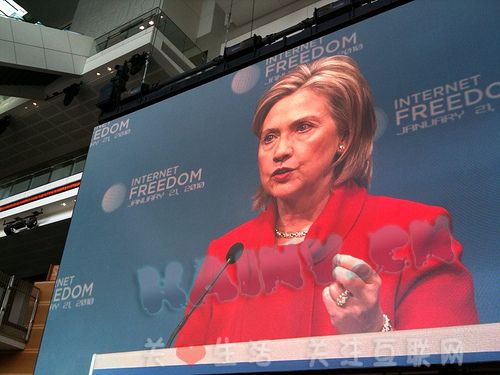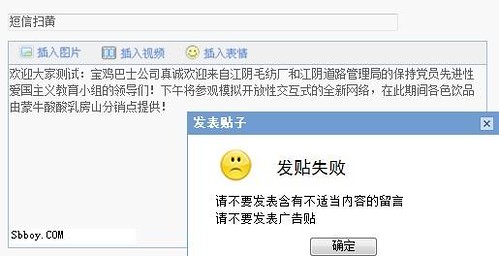西方:Hillary Clinton Extends Foreign Policy To The Internet And Wants Your Help
 In a defining speech today on Internet Freedom, Secretary of State Hillary Clinton extended foreign policy to the Internet, calling it a “global networked commons.” Her speech harked back to Franklin Roosevelt’s famous Four Freedoms speech, and updated each one (Freedom of Expression, Freedom of Worship, Freedom From Want, Freedom From Fear) to apply to the Internet. She also added a new freedom, the Freedom to Connect:
In a defining speech today on Internet Freedom, Secretary of State Hillary Clinton extended foreign policy to the Internet, calling it a “global networked commons.” Her speech harked back to Franklin Roosevelt’s famous Four Freedoms speech, and updated each one (Freedom of Expression, Freedom of Worship, Freedom From Want, Freedom From Fear) to apply to the Internet. She also added a new freedom, the Freedom to Connect:
The freedom to connect – the idea that governments should not prevent people from connecting to the internet, to websites, or to each other. The freedom to connect is like the freedom of assembly in cyber space.
Apparently, it is now the U.S. government’s foreign policy to protect and promote these freedoms throughout the information “commons” which extend beyond our physical borders. It is also U.S. foreign policy to encourage corporations, particularly those in the technology industry, to protect these freedoms. Call it corporate statecraft. Towards the end of the speech, Clinton applauded Google’s recent decision to rethink whether it will continue to operate in China following coordinated cyber attacks on its operations there. Not only that, she encouraged other companies to follow Google’s lead:
I hope that refusal to support politically-motivated censorship will become a trademark characteristic of American technology companies. It should be part of our national brand. I’m confident that consumers worldwide will reward firms that respect these principles.
Certainly, the Internet knows no national boundaries. But trying to impose our ideas of freedom onto other countries, especially dictatorships, may end up being a futile effort. Nevertheless, Clinton explains why she thinks it is important to try:
Ultimately, this issue isn’t just about information freedom; it’s about what kind of world we’re going to inhabit. It’s about whether we live on a planet with one internet, one global community, and a common body of knowledge that unites and benefits us all. Or a fragmented planet in which access to information and opportunity is dependent on where you live and the whims of censors.
Going through the various freedoms, below I’ve distilled some of what she had to say. On Freedom Of Expression, she notes:
Blogs, email, social networks, and text messages have opened up new forums for exchanging ideas – and created new targets for censorship.. . . Some countries have erected electronic barriers that prevent their people from accessing portions of the world’s networks. They have expunged words, names and phrases from search engine results. They have violated the privacy of citizens who engage in non-violent political speech. . . . With the spread of these restrictive practices, a new information curtain is descending across much of the world. Beyond this partition, viral videos and blog posts are becoming the samizdat of our day.
On Freedom Of Religion:
Just as these technologies must not be used to punish peaceful political speech, they must not be used to persecute or silence religious minorities.
On Freedom From Want:
. . . the internet can serve as a great equalizer. By providing people with access to knowledge and potential markets, networks can create opportunity where none exists. . . . A connection to global information networks is like an on ramp to modernity. . . . Information networks have become a great leveler, and we should use them to help lift people out of poverty.
On Freedom From Fear:
As we work to advance these freedoms, we must also work against those who use communication networks as tools of disruption and fear. . . . Governments and citizens must have confidence that the networks at the core of their national security and economic prosperity are safe and resilient. This is about more than petty hackers who deface websites.
The State Department is actively developing tools to help citizens of other countries express themselves freely on the Internet and circumvent censorship. Clinton also announced that the State Department will launch an “innovation competition” to help promote these freedoms abroad:
We’ll be asking Americans to send us their best ideas for applications and technologies that help to break down language barriers, overcome illiteracy, and connect people to the services and information they need. Microsoft, for example, has already developed a prototype for a digital doctor that could help provide medical care in isolated rural communities. We want to see more ideas like that. And we’ll work with the winners of the competition and provide grants to help build their ideas to scale.
Sounds like the State Department is going to start an Internet Freedom fund.
东方:黄色短信的标准有哪些?
 全国整治互联网低俗之风专项行动办公室针对公众反映的突出问题和网上实际情况,列出清理整治网上低俗内容的13条标准。
全国整治互联网低俗之风专项行动办公室针对公众反映的突出问题和网上实际情况,列出清理整治网上低俗内容的13条标准。
中国互联网协会互联网违法和不良信息举报中心消息,国务院新闻办、工业和信息化部、公安部、文化部、工商行政管理总局、广播电影电视总局、新闻出版总署等部门正组织开展整治互联网低俗之风专项行动,以遏制网上低俗之风蔓延,进一步净化网络文化环境。这次清理整治网上低俗内容主要包括:
1、直接暴露和描写人体性部位的内容;
2、表现或隐晦表现性行为、具有挑逗性或者侮辱性的内容;
3、以带有性暗示、性挑逗的语言描述性行为、性过程、性方式的内容;
4、全身或者隐私部位未着衣物,仅用肢体掩盖隐私部位的内容;
5、带有侵犯个人隐私性质的走光、偷拍、漏点等内容;
6、以庸俗和挑逗性标题吸引点击的内容;
7、相关部门禁止传播的色情和有伤社会风化的文字、音视频内容,包括一些电影的删节片段;
8、传播一夜情、换妻、性虐待等的有害信息;
9、情色动漫;
10、宣扬暴力、恶意谩骂、侮辱他人等的内容;
11、非法性药品广告和性病治疗广告等相关内容;
12、恶意传播侵害他人隐私的内容;
13、推介淫秽色情网站和网上低俗信息的链接、图片、文字等内容。


